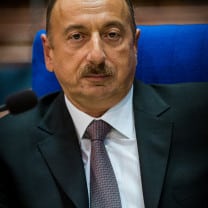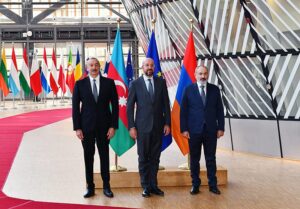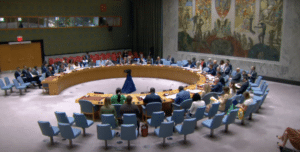Azerbaijan’s President Ilham Aliyev surprised many when he called for an early presidential election. On February 5th a decree was issued that moved the election from October 17 to April 11. With only two months until this early election, the Azerbaijani opposition was caught off guard. After the announcement, opposition leaders called the upcoming election rigged. The National Council of Democratic Forces (NCDF) was the first large opposition group to propose a boycott of the election. On February 10th another opposition party, the Musavat Party, announced that it wouldn’t participate in the elections. Musavat chairman Arif Hacili denounced the decree as “an operation to prolong Aliyev’s rule for another seven years.” The opposition boycotts are largely symbolic, as in the country tightly controlled by the President, Aliyev’s victory is a foregone conclusion.
Constitutional changes Aliyev’s consolidation of power goes back to 2003. He took office after his ailing father, President Heydar Aliyev, made him his successor as leader of the ruling and dominant New Azerbaijan Party. Like his father, Aliyev has shown authoritarian characteristics. His political party has dominated Azerbaijan since 1992.
In 2016 Aliyev expanded his presidential power. A decree was issued in which he proposed twenty-nine amendments to the constitution. Among the amendments were the prolonging of the presidential terms from five to seven years, the creation of the vice-presidency and the abolishment of minimum age for presidential candidates. Political commentators accused Aliyev of prolonging his presidency at the expense of democracy. Nonetheless the constitutional court found the changes lawful. The next step was a referendum. International observers criticized the format of the referendum. All twenty-nine amendments were on the ballot, making the choice difficult in a country in which the media is completely dominated by the government.
One of these amendments changed the national electoral code. With the change the president would be able to call early elections. This amendment and the twenty-eight others were approved by a large percentage of the electorate according to official results. Human rights activists, journalists and foreign observers criticized the constitutional changes as bringing Azerbaijan closer to a dictatorship. After the referendum Aliyev made other controversial moves. In February 2017 , he appointed his wife, Mehriban Aliyeva, as vice president.
Sideling the opposition? The decree calling early elections was issued four days after the official announcement by the New Azerbaijan Party that Aliyev would be their presidential candidate. A few days later, it was reported that the president had moved the date because the campaign season and the election itself would coincide with important national and international events such as the celebration of the independence of Azerbaijan People’s Republic from the Russian Empire. Non-partisan MP Zahid Oruj underlined that the early election was legal. “Early elections [are] international practice” according to him.
However the opposition suspected there was more to this. The National Council of Democratic Forces (NCDF) proposed the boycott of the election on February 6th. Jamil Hasanli, chairman of the NCDF, argued that the decision to have an early election would not have had a positive effect on the election. He recalled the 2013 election when in 58% of the polling stations falsifications were reported by the OSCE monitors. Hasanli was the presidential candidate for the NCDF in 2013. He won around 5% of the popular vote, finishing second behind Aliyev according to official results.
Leader of the Musavat Party, Arif Hacili, also denounced the decree. According to Hacili the opposition simply would not have the time to organize a campaign against Aliyev. The Liberal leaning party decided to pull back from the election. Hacili accused the government of sideling the opposition for their own personal gain. The Musavat presidential candidate, Isa Gambar, accepted the decision of the party, but called for protest. He warned Aliyev that with this attitude “his current term will not last for seven years, but will be very short”.
The allegations by the opposition were countered by the government as nonsensical. “The opposition has no social base or support from the electorate, as well as serious resources, and this is the reason for its defeat”.
Marginalized opposition The chances of the opposition winning the elections, or even doing well in them, are nihil. The grip of the New Azerbaijan Party on the state, media and society is so tight that no real opposition against the government is possible. Opposition parties and movements are marginalized, their leaders and prominent figures often harassed by the authorities, as are independent civil society representatives and critical journalists. This results in many political prisoners in the country.
Even though the opposition doesn’t have any power, the decree can nonetheless be seen as the sidelining of the opposition. Aliyev has personal reasons. The economic position of the oil rich country has been deteriorating since 2015. Low oil prices and a weak currency led to an economic crisis. By sidelining the opposition Aliyev is excluding any chance that the economic situation could be used to mobilize the people against him. The early election will also prevent monitoring agencies to form an effective monitoring campaign for the election. The election, already having a foregone conclusion, has become even more predictable.
Sources: rferl rferl Turan Turan



